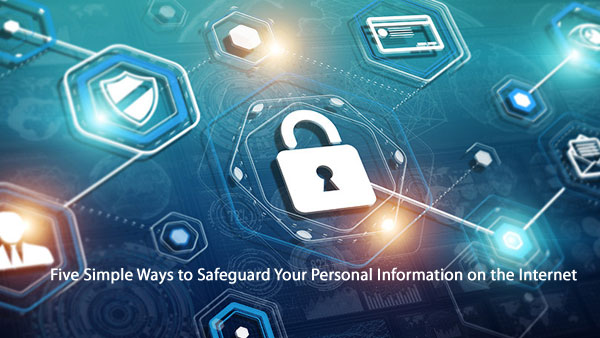In this technological world, protecting and safeguarding oneself against cyber threats has never been more crucial. Personal information is a valuable commodity for cybercriminals If you share your home address, birthday, social security number, phone number, and other personal details, then you are at a higher risk of cyberstalking, identity theft, and online harassment. You also need to be careful about the information which is available of you online. Cybercriminals can use the information available about you on multiple website and steal your identity.
Here are some ways to protect your personal information while surfing the internet:
1- Use different and strong passwords
One of the most common mistakes which people made is that they use simple passwords or same passwords for all of their online accounts and devices. Simple passwords like birthdates, names of children, 123456789, etc, are very easy to hack. If you use complex passwords, such as passwords which are long and have a mix of uppercase and lowercase letters, symbols, and numbers, it becomes harder for identity thieves to hack into your account. Moreover, use a unique password so that even if one of your accounts gets compromised, others will stay safe.
2- Provide personal information only on encrypted websites
Do not purchase anything from websites which are not encrypted. Whether you are banking or shopping online, only provide information when the site is encrypted. The secure websites have https at the beginning or their address. A few sites use encryption solely on the log-in page. These websites aren’t secure because even if a single part of the user’s session is not encrypted, the user’s complete account and the information is at risk. So while making transactions or giving out personal details online, make sure that each and every page of the website is encrypted.
3- Be careful while posting personal details on social media
Look up your name on Google or any other search engine and assess the results. It is highly likely that the search result will consist of your personal information. There are a significant number of dangers associated with oversharing on social media. While you may enjoy the appeal of Facebook, Instagram, Twitter, etc, it leads to privacy concerns. Identity thieves love folks who share too much on social media. They monitor such profiles, access the social media privacy settings, and gather all the relevant information which they can use for identity theft.
4- Download software and other media carefully
When downloading something online, be extra mindful. This software can come laced with malware, worms, Trojan horses, or keyloggers. Use a robust antivirus program to scan the file before downloading it. If the website looks suspicious, do not download from it. Use a Website Scanner to check whether or not the site is safe. Do not click on advertisements. Do not click on links attached to emails without verifying the sender. Such emails may look authentic and they may appear to have originated from a trusted party, but in many cases, these emails contain ransomware.
5- Use Antivirus Software
Download and install a robust antivirus program on your computer. Enable the automatic updates feature, and scan your system periodically. Antivirus software provides real-time protection against all kinds of viruses, malware, spyware, ransomware, adware, etc. It protects your identity by keeping the hackers at bay by safeguarding the computer system and network. Use a combination of firewall and antivirus to completely protect your system.
Some of the above-discussed tips are really helpful for you. And we already recommend you to install the antivirus that completely protects your device. Norton is one of the renowned names in the antivirus industry nowadays. If you need more information about the Norton Antivirus then you can contact the Norton Customer support or visit Norton.com/setup or Norton.com/myaccount.
Source: http://norton-setup.net/five-ways-to-safeguard-personal-info-on-internet/





No comments
Note: only a member of this blog may post a comment.